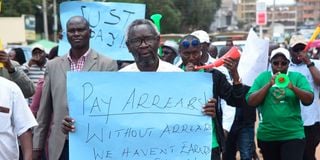Premium
Varsities shutdown looms as salaries dispute talks collapse

Members of University Academic Staff Union, Moi University Chapter demonstrate in Eldoret City, Uasin Gishu County on August 29, 2024.
What you need to know:
- The notice will be issued by the national officials led by the secretary-general, Constatine Wasonga.
- Their grievances include delayed salaries, failure to pay their full salaries and remit statutory deductions.
Learning in all 35 public universities may grind to a halt in a week’s time following the collapse of negotiations between the Inter-Public Universities Council Consultative Forum (IPUCCF) and the Universities Academic Staff Union (Uasu) over the 2021–2025 collective bargaining agreement (CBA).
As a result, Uasu is expected to issue a 7-day strike notice on Wednesday. Sources within the union indicated that the parties had failed to reach an agreement despite the talks being facilitated by a conciliator. The notice will be issued by the national officials led by the secretary-general, Constatine Wasonga.
“It will be a total shutdown across all public universities and constituent university colleges,” the source said.
This will be the second strike notice by Uasu in just over a month after the union called its members to withdraw labour on August 6 2024 in universities that have been facing various problems.
Their grievances include delayed salaries, failure to pay their full salaries and remit statutory deductions and third-party deductions, including loans, insurance premiums, and pension contributions.
The Nation has also established that learning has already stalled in some universities after lecturers downed tools to press on the implementation of the 2017–2021 (CBA).
The strike, which began two weeks ago, has mainly affected first year students since continuing students only started reporting last week.
Moi University Uasu branch Secretary Ojuki Nyabuta stated that the strike would go on until their demands are met. He that for many employees who have been promoted and awarded salary increases, the adjustments do not reflected in their pay.
“There will be no teaching and learning at the university until we are paid our salary arrears and the remittance of monthly contributions worth Sh4.1 billion to third parties. Pension contributions, insurance premiums, and loan repayments have not been paid for years, putting the financial well-being of staff members and their families at risk. We cannot continue working under such conditions where we are not only underpaid but also deprived of the benefits we are entitled to,” said Mr Nyabuta.
“Since 2016, many staff members have passed away without their dependents receiving the due benefits, with 53 such cases reported by mid-2022, a number that has now grown to nearly 70,” said Mr Nyabuta.
Mr Nyabuta demanded a definite date for salary payments, rather than leaving it at the employer's discretion.
Other grievances include salary discrepancies for promoted staff, improper handling of funds generated from the Parallel Student Support Programme (PSSP), and unresolved issues regarding promotion criteria.
“Many employees who have been promoted and awarded salary increases have not received the corresponding adjustments. Additionally, the PSSP which supports students not sponsored by the government after 2019, remains a concern. We are currently working on policies to determine how funds generated from the PSSP should be distributed, particularly the portion allocated to service providers, including lecturers who teach these programs. However, the employer has yet to properly implement these policies,” said Mr Nyabuta.
The Uasu Technical University of Kenya chapter secretary-general Fred Sawenja criticised the university management for neglecting lecturers’ concerns.
He said that staff have not attended lecturers due to ongoing disputes, as they demand equitable salary payments comparable to those at other universities.
“The strike began two weeks ago, and no classes are being held. They have to meet our demands before we attend classes. We expect to receive salaries equal to those at other institutions, not at a reduced rate and have a return-to-work. Moreover, all statutory and third-party deductions—such as NHIF, NSSF, pension, bank loans, and insurance—must be promptly remitted,” Sawenja asserted.
The strike has entered its second week at Jomo Kenyatta University of Agriculture and Technology (Jkuat), with tensions escalating as national strike plans loom. Muiga Ragara, the secretary-general of the Uasu Jkuat chapter, expressed the union's frustration with lack of progress in negotiations with the government.
“Certainly, there is a strike ongoing. However, the national strike went quiet for a while due to attempts at dialogue and negotiation, which is why we temporarily paused our actions. Despite these efforts, the situation has not seen significant improvement, and the strike at Jkuat has been active for two weeks now,” Mr Ragara said.
Mr Ragara revealed that the university administration has escalated the issue by obtaining a court order mandating a cessation of the strike.
"We have been served with a court order to stop the strike, but we remain steadfast in our cause. The court order has added a layer of complexity to our efforts," he stated.
“The national strike declaration tomorrow will likely influence the dynamics at JKUAT and across other institutions. Our struggle is not isolated but part of a larger fight for better working conditions and fair treatment for academic staff. We need concrete solutions, not just promises," he added.
The temporary court injunction restrains Uasu members from participating in the strike or interfering with the operations of the university, pending the hearing and determination of the application.
On June 24, 2024, the university received a strike notice from the JKUAT chapter of Uasu. In response, the Ministry of Labour on July 17, 2024, appointed Charles Gondosio from the Thika Labour Office as a conciliator to facilitate dialogue between the parties.
The ministry directed the lecturers to suspend their strike notice while the dispute was being addressed.
[email protected]; [email protected]






